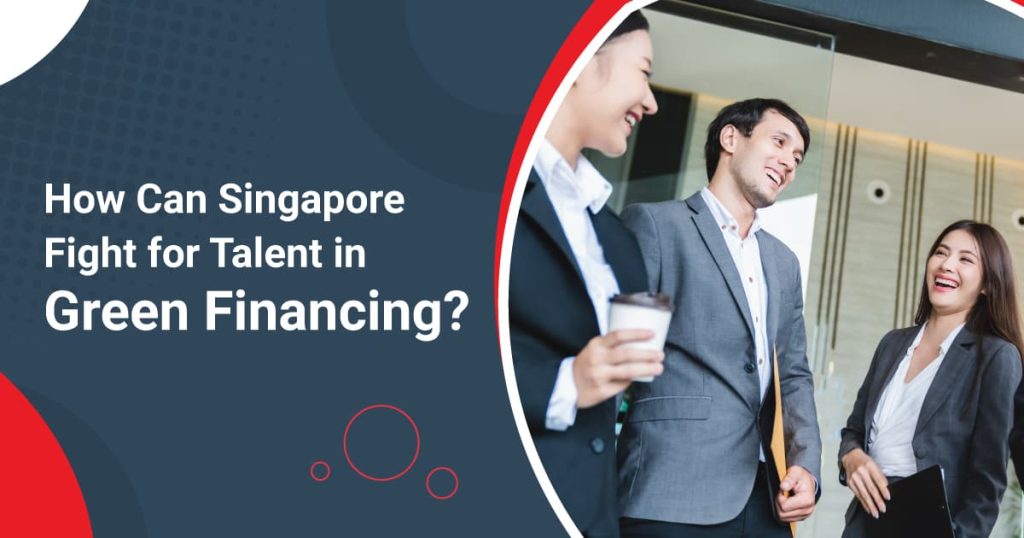 Green is growing – but can Singapore find key talent to transform the sector?
Green is growing – but can Singapore find key talent to transform the sector?
The Monetary Authority of Singapore (MAS) has predicted there will be US$200 billion per year of green investments into ASEAN countries by 2030.
From green bonds to green loans, these forms of green financing are steadily making their way into the region. And as the world shifts towards achieving sustainable development goals and environmental sustainability, this trend will only continue in the future.
Singapore has certainly seen the Environmental, Social, and Governance (ESG) writing on the wall, launching the Singapore Green Plan 2030 in 2021, and more specifically, the Enterprise Sustainability Programme within it.
Unsurprisingly, ESG job demand has also risen 257% in the past three years. With the rise in awareness and demand for sustainable finance comes a new set of challenges — namely, a scarcity of professionals with the right skill sets.
What Steps Are Singapore Taking to Build Green Financing Talent?
Clearly, there is demand – SkillsFuture Singapore lists the green economy as an area of high growth. Parliamentary discussions have also emphasised on the urgent need to build skills for green jobs.
The big problem is, green finance is a young field, with few experts to be found. What exactly is the skill set for each particular industry? What about each business? Being a relatively small city-state, the talent pool in Singapore is even smaller.
It is essential for Singapore to grow its talent capable of shaping the future for improved environmental and social outcomes. This step is necessary for the country to enhance the green economy and position it as a sustainable finance hub.
The good news is, Singapore can take, (and is taking) proactive steps to ensure that we have the human capital to meet this rising demand. Here are some thoughts on how Singapore can stay ahead of the green finance game.
Related Read: Why is Singapore a Prime Spot for Top-Tier Foreign Talent? »
A Focus on Young Talent
Education has long been the cornerstone of Singapore’s development strategy (with over 91% tertiary enrolment), and this is no different when it comes to the environment and green finance.
The Ministry of Education (MOE) has been working with Institutes of Higher Learning (IHLs) since 2021 to create courses and programmes that develop and deepen students’ knowledge and skills in sustainability.
One such example is Temasek Polytechnic’s Integrative Built Environment Centre, which aims to train approximately 2,000 students on ESG practices through internships.
In 2021, the Institute of Technical Education (ITE) College East established the ITE-SembCorp Centre for Sustainable Solutions to provide a training centre for integrated sustainable solutions.
The goal is to train 400 students each year so that they can join Singapore’s growing solar industry.
The National University of Singapore (NUS) has also partnered with the Sustainable and Green Finance Institute (SGFIN) to launch a new Master of Science programme in Sustainable and Green Finance.
Students will be trained in sustainable finance theories, frameworks, get exposure to green innovations, and understand real-world problems faced.
They will also be equipped with the skills to think beyond the conventional methods of optimising financial profits. Ultimately, they will urge companies to make Singapore a better place to live in for generations ahead.
The good news is that this is a terrific long-term bet — the younger generation is already onboard with ESG. Being raised with the internet and being exposed to a more globalised world, they are far more aware of the issues we face and are eager to make a difference.
Building Talent From Within
Continuing education and upskilling will be crucial for Singapore to stay ahead of the curve.
Unfortunately, most upper management is far too busy focusing on their core responsibilities to see the bigger picture and how sustainability can be integrated into their business strategy.
To some executives, not only does ESG look like just another acronym to comply with, it looks like it has the potential to open up the business to new risks and liabilities.
They need to be convinced that this is not the case — ESG can create new opportunities for growth, lower costs, and attract top talent. There is a reason MAS is making such a big bet on it.
Fortunately, those higher learning courses mentioned earlier are also open to those already in the workforce.
Institutes like Temasek Polytechnic’s Integrative Built Environment Centre and ITE-SembCorp Centre for Sustainable Solutions aim to provide working professionals with the knowledge and skills they need to implement sustainable solutions in their organisations.
These are just a few examples, but they illustrate an important point — if we want to make an impact now, we need to focus on upskilling those who are already in the workforce. The future is important, but the present is where the rubber meets the road.
Seeking Talent From Abroad With the ONE Pass
Singapore has always been brilliant at modifying and evolving its working visas to attract the best talent the world has to offer.
The latest such visa is the Overseas Networks and Expertise Pass (ONE), which is Singapore’s most flexible working visa to date. Selected talent can take as long as they need to find a job, and they can work for multiple employers at any one time.
They are also allowed to establish their own business, even if they are employed by another business at that time.
This is in contrast to other visas like the Employment Pass (EP) and Personalised Employment Pass (PEP) which have more restrictions as it relates to entrepreneurship and employment.
The ONE Pass is valid for 5 years, which is much longer than the 2 years of the EP and 3 years for the PEP.
The ONE Pass aims to make a great difference for entrepreneurs and those who wish to establish themselves in Singapore, but it should also have a significant impact on attracting appropriately skilled talent in the green finance space.
Applications are available from 1 January 2023, but there are restrictions. If you wish to find out how to get overseas green finance talent, you can read more about the ONE Pass here.
A Long Fight for Sustainability
Sustainability is a long-term mission, and we need experienced professionals to help us understand and manage key problems.
As Singapore strives to become a global leader in sustainable finance, it is important that the workforce is equipped with the appropriate skills and knowledge.
If we can focus on all three of these areas — students, working professionals, and overseas talent — we will be in a much better position to achieve our green finance goals.
Contact our team
FAQs
What are some ways Singapore can obtain qualified talent in green financing?
- Singapore can focus on building its local pool of talent and on attracting talent from abroad in the race for scarce human capital.
What are some of Singapore’s green finance initiatives?
- MAS has launched a few grant schemes to aid companies in the sector, including the world’s first Green and Sustainability-Linked Loan Grant Scheme.
Why should you engage a corporate services provider to get work visas for your firm’s talent?
- InCorp is a corporate services provider that offers a wide range of related services. Apart from being a trusted business for work visas, we can also help your firm in other corporate ways.




